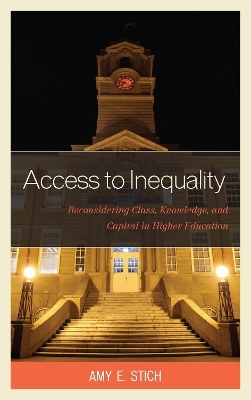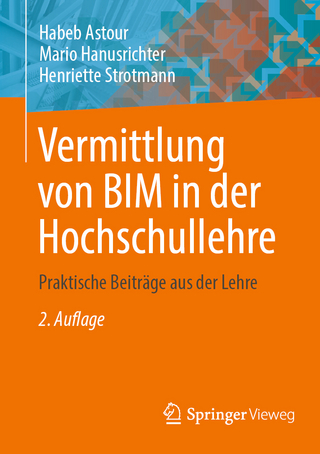
Access to Inequality
Reconsidering Class, Knowledge, and Capital in Higher Education
Seiten
2014
Lexington Books (Verlag)
978-0-7391-9772-1 (ISBN)
Lexington Books (Verlag)
978-0-7391-9772-1 (ISBN)
In the interest of uncovering the mechanisms through which democratization, as currently conceived, preserves and perpetuates inequality within the system of higher education, this book reconsiders the role of social class in the production and dissemination of knowledge, the valuation of cultural capital, and the reproduction of social inequality.
Set against the backdrop of democratization, increased opportunity, and access, income-based gaps in college entry, persistence, and graduation continue to grow, underlining a deep contradiction within American higher education. In other words, despite the well-intended, now mature process of democratization, the postsecondary system is still charged with high levels of inequality. In the interest of uncovering the mechanisms through which democratization, as currently conceived, preserves and perpetuates inequality within the system of higher education, this book reconsiders the role of social class in the production and dissemination of knowledge, the valuation of cultural capital, and the reproduction of social inequalities. Drawing upon the author’s year-long qualitative research study within one “democratized” institution of higher education and its associated art museum, Access to Inequality explores the vestiges of an exclusionary history within higher education and the art world—two related contexts that have arguably failed to adequately respond to the public’s call to democratize.
Set against the backdrop of democratization, increased opportunity, and access, income-based gaps in college entry, persistence, and graduation continue to grow, underlining a deep contradiction within American higher education. In other words, despite the well-intended, now mature process of democratization, the postsecondary system is still charged with high levels of inequality. In the interest of uncovering the mechanisms through which democratization, as currently conceived, preserves and perpetuates inequality within the system of higher education, this book reconsiders the role of social class in the production and dissemination of knowledge, the valuation of cultural capital, and the reproduction of social inequalities. Drawing upon the author’s year-long qualitative research study within one “democratized” institution of higher education and its associated art museum, Access to Inequality explores the vestiges of an exclusionary history within higher education and the art world—two related contexts that have arguably failed to adequately respond to the public’s call to democratize.
Amy E. Stich is a postdoctoral research associate at the University at Buffalo, State University of New York.
Chapter 1: The Democratization of American Higher Education
Chapter 2: Class, Knowledge, and Capital in Interconnected Context
Chapter 3: Reputational Affects: Inside a Working Class College
Chapter 4: Classifying Knowledge by Hand, by Head
Chapter 5: Elite Knowledge within a Non-Elite Space: Language, Literacy and “Intertextual Habituality”
Chapter 6: Re-conceiving Democratization
Appendix: A Note on Methods
| Verlagsort | Lanham, MD |
|---|---|
| Sprache | englisch |
| Maße | 155 x 229 mm |
| Gewicht | 231 g |
| Themenwelt | Sozialwissenschaften ► Pädagogik ► Erwachsenenbildung |
| Sozialwissenschaften ► Soziologie ► Empirische Sozialforschung | |
| ISBN-10 | 0-7391-9772-X / 073919772X |
| ISBN-13 | 978-0-7391-9772-1 / 9780739197721 |
| Zustand | Neuware |
| Haben Sie eine Frage zum Produkt? |
Mehr entdecken
aus dem Bereich
aus dem Bereich
praktische Beiträge aus der Lehre
Buch | Softcover (2024)
Springer Vieweg (Verlag)
49,99 €
Lernende in ihrem Lernprozess wirksam begleiten und unterstützen. Ein …
Buch | Softcover (2024)
WBV Media (Verlag)
20,00 €
Prüfungsaufgaben - Rechnungswesen, Wirtschaft, Recht, Steuern
Buch | Softcover (2023)
Europa-Lehrmittel (Verlag)
26,90 €


